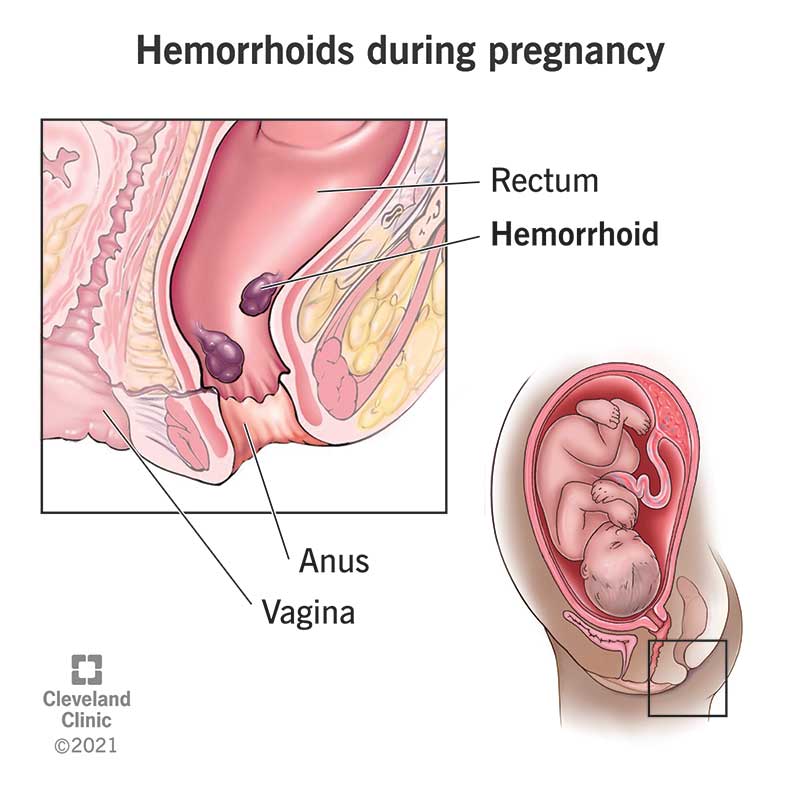Hemorrhoids are swollen veins surrounding your anus that can make having a bowel movement extremely unpleasant when you’re pregnant. They’re common in pregnancy and usually resolve after you have your baby. In the meantime, you can make changes to your diet and lifestyle that can help soothe your symptoms. Your healthcare provider can recommend treatments, too.

Hemorrhoids are swollen veins on or near your anus. Sometimes the veins are in your anus (external hemorrhoids). Other times, they’re inside your rectum, the section of large intestine that leads to your anus (internal hemorrhoids). No matter where they are, hemorrhoids are an unpleasant but common part of pregnancy. The good news is that they’re usually easy to manage with home treatments. They often go away after you’ve had your baby.
Advertisement
Cleveland Clinic is a non-profit academic medical center. Advertising on our site helps support our mission. We do not endorse non-Cleveland Clinic products or services. Policy
Yes. If you’re pregnant and have hemorrhoids, you’re not alone. Hemorrhoids during pregnancy are common, especially in the third trimester and up to one month after you’ve had your baby. About 30% to 40% of people who are pregnant get hemorrhoids.
Hemorrhoids are swollen veins on your anus. Anal fissures are tears on your anus. They’re different conditions, but they’re both common during pregnancy. They share similar symptoms, too. Hemorrhoids and anal fissures can both feel itchy or painful. And they can both cause bleeding that shows up in your stools or on toilet paper after you wipe. The bleeding from an anal fissure or a hemorrhoid is usually harmless. Still, if you’re pregnant and notice blood in your stool, you should always contact your healthcare provider. They can let you know for sure that what’s causing your bleeding is a hemorrhoid or an anal fissure instead of something more serious.
Advertisement
Anyone can get hemorrhoids, but your odds of getting them go up when you’re pregnant. The added weight of a growing fetus and the hormone changes that support pregnancy both increase your chances of having hemorrhoids.
You can have hemorrhoids without having any symptoms at all. If you do have symptoms, they may include:
It can be scary to see blood in your stool, but therectal bleeding from an internal hemorrhoid is usually harmless. Still, see your provider about any bleeding you notice if you’re pregnant.
Advertisement
Hemorrhoids appear when pressure bears down on your pelvic area and the lower part of your digestive tract (bowel). The pressure can be so heavy that even the veins in your anus absorb the impact, so much so that they swell. During pregnancy this pressure comes from:
Hemorrhoids during pregnancy are common enough that your healthcare provider will likely know that you have hemorrhoids by how you talk about your symptoms. To be sure, your provider may:
None of the options sound pleasant, but getting a hemorrhoids diagnosis is more uncomfortable than painful. And don’t be embarrassed. This is a routine diagnosis for your provider.
Education is often the best treatment for hemorrhoids until they go away on their own. They usually go away after your baby arrives.
Having regular bowel movements can ease the strain on your hemorrhoids. The less you’re straining on the toilet, the less stress you’re putting on these veins. Here’s how you do it:
Try some home remedies for hemorrhoids to relieve any discomfort you’re feeling.
There’s nothing you can do about the added pressure from the fetus that’s putting strain on your body, but you can change your habits so that you’re reducing the strain that you can control. Here are some tips:
If at-home care isn’t working, your healthcare provider may recommend a procedure to remove your hemorrhoids that’s safe for you and your baby.
If constipation is making your hemorrhoids unbearable, your healthcare provider may prescribe a laxative, hemorrhoid cream, or a fiber supplement. Always check with your provider before taking any over-the-counter medications. Your provider is your best resource for making sure you’re choosing options that are effective and safe.
You can’t always prevent hemorrhoids, but you can put good habits in place to reduce your chances of getting constipated. Eat fiber-rich foods and drink the right amount of fluids each day. Work Kegel exercises into your daily routine to encourage healthy circulation in your anus and rectum.
You’ll likely experience some discomfort that you and your healthcare provider can work together to address. Your hemorrhoids may get worse before they get better. Sometimes the pushing during labor makes hemorrhoids worse immediately after delivery. Within a few weeks, though, your hemorrhoids should be getting better.
Reach out to your provider if:
There’s no need to worry about hemorrhoids, especially when you know how to manage symptoms if you do get them. Hemorrhoids can be uncomfortable, but they’re harmless and usually go away eventually.
A note from Cleveland Clinic
Hemorrhoids can be an uncomfortable and even embarrassing part of pregnancy, but don’t worry if you have them. Relieving constipation and finding ways to soothe your symptoms can help make them more manageable. If your symptoms are bothering you and home treatments aren’t helping, reach out to your provider.
Last reviewed on 07/18/2022.
Learn more about our editorial process.
Advertisement
Cleveland Clinic is a non-profit academic medical center. Advertising on our site helps support our mission. We do not endorse non-Cleveland Clinic products or services. Policy